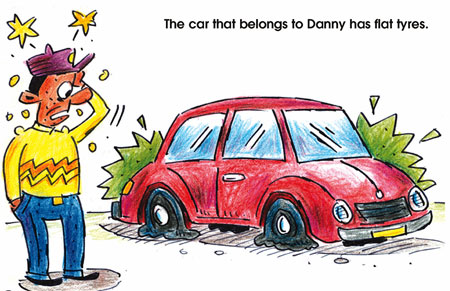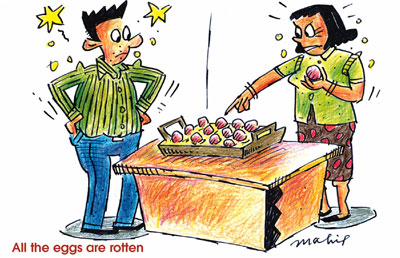|

by R. S. Karunaratne
Relative and main clauses
When we use a relative clause to describe the subject of the main
clause we insert the relative clause after the subject and before the
finite verb of the main clause.
The robbers who broke into the bank were arrested after a week.The
police officer who was very friendly helped me to find my way home.
Young people like music which is loud and fast.
The writer who wrote The Key is here to autograph his novel.

I still listen to the song that you sang many years ago.
The finite verb of the main clause must agree with its subject.
Someone who is very good in English is likely to be appointed as a
lecturer.
The youth who climbed the mountain is my brother.
The books which are on my table belong to me.
The author who writes novels is here to meet you.
The best speaker that the club has produced is always the winner.
A relative clause describing a noun which is the subject of the main
clause is placed immediately after that noun.
The book which I am reading belongs to my father.Some children who
are very playful at home behave well at school.The poems that he writes
are often amusing.
Alex who I didn’t like at the beginning is now my best friend.The
journalist who wrote the story was paid $100.
Since the finite verb of the main clause is separated from the
subject, we should take special care to see that they agree.
The car that belongs to Danny has flat tyres.
The questions which we answered were very difficult.
One of the comedians who lived in the past was Eddie Jayamanne.
The apples that we eat are imported from Australia.
Films that depict violence are not suitable for children.
[Activity ]
Underline the correct verb and check your answers with the key.
1. The procession we watched was/were telecast live.

2. Elephants whose habitats are destroyed has / have nowhere to go.
3. The prettiest of the girls who are dancing on the stage is / are my
sister.
4. The man who is responsible for the robbery is / are evading arrest.
5. The exhibition which was held last week was / were a success.
6. The boy who was interviewed on television are / is a Thomian.
7. The jak tree which grew in my garden has / have been cut down.
8. The lady who is talking to them is / are an architect.
9. The people who come here is / are poor.
10. The boy who saved me from drowning is / are known to my father.
[Key]
1. was 2. have 3. is 4. is 5. was 6. is 7. has 8. is 9. are 10. is
Test your vocabulary
A large vocabulary, better self expression and effective
communication are passports to success. Today we bring you 20 words to
test your vocabulary. Read the headword in bold type and indicate its
meaning from (a), (b) and (c). Check your answers with the key.Score: 15
- 20 Excellent 10 - 14 Good 1 - 9 Poor
1. Abode is a (a) dwelling (b) board (c) flat surface
2. To be plentiful is to (a) be grand (b) be in short supply (c) be in
abundance
3. A condensed version of a book is (a) an elaborate version (b) a
shortened version (c) its title
4. The opposite of ignorance is (a) knowledge (b) pride (c) humility
5. The opposite of life is (a) breathing (b) health (c) death
6. The plural form of beauty is (a) beautific (b) beautiful (c) beauties
7. What do you call something that prevents you from going on? (a) storm
(b) hindrance (c) break
8. A biologist studies (a) rural life (b) land animals (c) all living
organisms
9. When you call somebody an ass (a) he is a fool (b) he is a wise
person (c) he is a fat person
10. A geologist studies (a) the physical qualities of the earth (b) the
underworld (c) the human behaviour
11. Addenda means (a) things not mentioned (b) from the inception (c) a
list of additions
12. Accede is to (a) refuse (b) agree (c) remember
13. To babble is to (a) to sing a song (b) to talk intelligently (c) to
talk in a confused and silly way
14. When somebody goes bankrupt (a) he is unable to pay what he owes (b)
he becomes rich (c) he is happy
15. The opposite of portable is (a) pretty (b) moving (c) stationary
16. Opprobrium means (a) lavish praise (b) severe criticism (c)
acquisition
17. A dermatologist specialises in (a) eye diseases (b) heart diseases
(c) skin diseases
18. A bookworm is a (a) person who reads a lot (b) a worm found in books
(c) person who collects books
19. A cemetery is a place where (a) people hold meetings (b) dead bodies
are buried (c) children play
20. To contradict is to (a) state the opposite of what somebody else has
said (b) praise somebody (c) deny
[Key]
1. (a) 2. (c) 3. (b) 4. (a) 5. (c) 6. (c) 7. (b) 8. (c) 9. (a) 10.
(a) 11. (c) 12. (b) 13. (c) 14. (a) 15. (c) 16. (b) 17. (c) 18. (a) 19.
(b) 20. (a)
Starters:
Use of ‘all’, ‘most’ and ‘some’
‘All’ means ‘every one of, the complete amount of or the whole of
anything’.
All men are mortal.
Be kind to all animals.
She has drunk all the milk.

All the eggs are rotten.
All my friends have cars.
All the big cities have the same problems.
As an adverb ‘all’ means ‘completely.’
The ice-cream was all eaten by the children.
I’m going to paint the house all in white.
Oh, you’ve got coffee all over your shirt!
He’s been all over town looking for accommodation.
I know all about your activities.
The beggar lived all alone in a small hut.
We use ‘all’ directly before the main verb in a sentence.
“You all need to do more exercises”, said the teacher.
We all knew that the results would be out today.
Do you all agree with my suggestion?
Have we all forgotten his birthday?
They all need some training.
We can use ‘all’ before the subject of the sentence.
All the students need to work hard.
All the fishermen were reported missing.
All the eggs have been sold.
All the cars he uses are comfortable.
All the pickpockets have been rounded up.
We use ‘all’ to mean ‘everything’ only before a relative clause.
I told the inspector all that I knew.He gave certificates to all who
followed the course.Don’t be duped by all that glitters.Everything will
come to all who wait patiently.Appointment letters will be posted to all
who passed the test.
When we use a pronoun to refer to all things, we do not use ‘all’ but
‘everything.’My French is good but I don’t understand everything.Robbers
broke into the bank and took away everything.The children started
picking mangoes and ate everything.
[Most]
‘Most’ means ‘the biggest number of, more than anything or anyone
else’.
Which of you earns the most money?
We use ‘most’ to form the superlative of many adjectives and adverbs.
Shan is the most intelligent student I know.
‘Most’ also means ‘almost all.’
She doesn’t eat meat, but she likes most types of fish.
‘Most’ can mean ‘very’.
It was a most beautiful painting.
We use ‘most of’ before a plural noun that has a pronoun or determiner
in front of it.
Most of the parents behaved well.
Most of the hills were covered with snow.
Before a plural noun that does not have a determiner or pronoun, we use
‘most.’
Most students do not wear ties.
Most rich people are stingy.
[Some]
‘Some’ means an amount or number of something which is not stated or
not known.
There’s some rice in the kitchen, if you’d like it.
Here’s some good news you might be interested in.We have some
problems with the new computers.You have to do some more work to pass
the examination.’Some’ is used to refer to a particular person or thing
without stating exactly which one.
Some lucky person will win the car.
There must be some way to open the door.
We use ‘some’ at the beginning of a sentence to show anger or
disapproval.
Some people just do not know how to use the toilet.
‘Some’ can be used before a noun to show how good something or somebody
is.
Wow, that was some party!
‘Some’ is used in offers or requests, when we expect people to say
‘yes.’
Would you like some more ice-cream?
[Activity ]
Fill in the blanks with ‘all, most’ or ‘some’. Check your answers
with the key.
1. ............. of the children are hungry.
2. ............... of this money is yours.
3. ............. the animals are not ferocious.
4. Do you like ............... cake?
5. We cannot trust .............. people.
6. I want a piece of the cake but not ............ of it.
7. I have read ............. novels but not short stories.
8. Do you want ............. this money?
9. ............... of the questions were difficult.
10. .............. shops are open on holidays.
[Key:]
1. Most 2. Some 3. All 4. some 5. some 6. all 7. some 8. all 9. Most
10. Some
Word building
It is useful to know how to build up word families. For a start,
let’s make adjectives from nouns. Write the relevant adjectives against
the following nouns and check your answers with the key.
[Noun] [Adjectives]
1. ability .......................
2. accident .......................
3. achievement .......................
4. act ........................
5. activity ........................
6. advantage ........................
7. advice ........................
8. agreement ........................
9. aim ........................
10. anger ........................
11. argument ........................
12. art ........................
13. attention ........................
14. authority ........................
15. behaviour ........................
16. belief ........................
17. blood ........................
18. break ........................
19. brother ........................
20. calculation ........................
21. care ........................
22. centre ........................
23. challenge ........................
24. change ........................
25. character ........................
26. circle ........................
27. cleaner . ......................
28. clothes ........................
29. collection ........................
30. colour ........................
31. combination ........................
32. commitment ........................
33. communication ........................
34. comparison ........................
35. competition ........................
36. conclusion ........................
37. condition ........................
38. confidence ........................
39. confusion ........................
40. connection ........................
[Key]
1. able 2. accidental 3. achievable 4. acting 5. active 6.
advantageous 7. advisable 8. agreeable 9. aimless 10. angry 11. arguable
12. artistic 13. attentive 14. authoritative 15. behavioural 16.
believable 17. bloody 18. broken 19. brotherly 20. calculating 21.
careful 22. central 23. challenging 24. changeable 25. characteristic
26. circular 27. clean 28. clothed 29. collected 30. coloured 31.
combined 32. committed 33. communicative 34. comparable 35. competitive
36. conclusive 37. conditional 38. confident 39. confused 40. connected |


